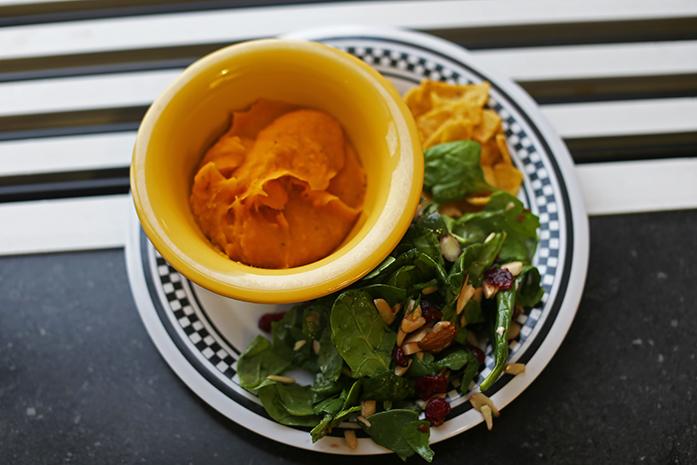Imagine being a college student and not being able to eat ramen. Welcome to the world of a gluten-free diet.
Freshman Gillian Herrin was diagnosed with celiac disease approximately two years ago, which means she has a reaction whenever she consumes anything with gluten — a protein found in wheat and other grains.
“It’s really, really dangerous for me to have gluten,” she said. “I could get cancer. I could get stomach ulcers because it, like, poisons me.”
Although Herrin is relying on the dining halls for her main source of food, she keeps a stockpile of gluten-free snacks in her dorm room. She said it can get expensive to eat gluten-free while in school.
“If you miss a meal, a lot of kids are like, ‘Oh, it’s OK; I can go get a hot dog for like $2,’” Herrin said. “I can’t really do that because if I’m going to eat something that’ll actually fill me up, it’ll cost me a decent amount of money, which is also why I have my hoard of Chipotle bags.”
Senior Lisa Gordon, another student with celiac, has been navigating around her dietary restriction for six years. She lived and ate in Hillcrest as a freshman and said — although she did not feel like there was a lot of variety in the gluten-free options — it was not bad.
“I was on the track team, so it was important that I had well-balanced meals,” Gordon said. “I felt like I could get that in the dorm.”
UI Food Service nutrition specialist Laura Croteau said the gluten-free products offered by University Dining are things most students would typically have every day, such as bread or noodles. She said she is not aware of any plans to expand gluten-free dining options anytime soon.
“I think whenever you have a dietary restriction, you have to take it upon yourself a little bit,” Gordon said. “You can’t expect a restaurant or a cafeteria to totally cater to you, but I think [the dining halls] did do a good job, and I think it’s gotten better in the past couple of years.”
Croteau said plenty of students choose to just navigate the dining halls on their own instead of relying on the daily online menus. There are line signs above each dish that indicate whether or not the food is gluten free, vegan, or otherwise.
When Gordon was a freshman, she said, the dining halls used to mainly label the obvious gluten-free items such as fruit. Now, she said, they seem to have made an effort to label some of the more vague dishes — such as pork secreto with mango chutney.
She thinks it shows how gluten-free students are treated the same as vegetarians or vegans.
Herrin said most people do not realize that gluten is in so many things, and as a result, she has to ask a lot of questions in the dining halls.
“I remember I was asking about the salad dressing [at Burge] … and the girl didn’t even know what gluten was, so she had to give me the huge tub to read,” Herrin said. “[The information] is there, but once again, I backed up the line for like 10 minutes because I had to read all that fine print.”
Students worried about cross-contamination can order from a menu in advance and arrange for their meals to be made in the back of the kitchen. Croteau said students must submit a special accommodation form and a doctor’s note.
Gordon said she would advise gluten-free freshmen to talk to people in the cafeterias because when she finally did, it made eating less of a stress for her.
Croteau said she encourages all students with any kind of dietary need or restriction to meet with her.
“If we don’t know how big the population is or if the demands are high and we don’t know about it, then it’s hard to better serve those customers,” she said.







